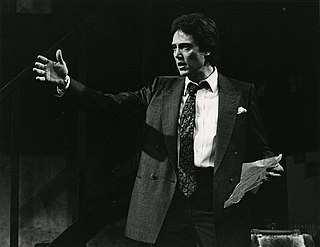 W
WIn theatre, a monologue is a speech presented by a single character, most often to express their thoughts aloud, though sometimes also to directly address another character or the audience. Monologues are common across the range of dramatic media, as well as in non-dramatic media such as poetry. Monologues share much in common with several other literary devices including soliloquies, apostrophes, and asides. There are, however, distinctions between each of these devices.
 W
W"All the world's a stage" is the phrase that begins a monologue from William Shakespeare's pastoral comedy As You Like It, spoken by the melancholy Jaques in Act II Scene VII Line 139. The speech compares the world to a stage and life to a play and catalogues the seven stages of a man's life, sometimes referred to as the seven ages of man.
 W
WMolly Bloom is a fictional character in the 1922 novel Ulysses by James Joyce. The wife of main character Leopold Bloom, she roughly corresponds to Penelope in the Odyssey. The major difference between Molly and Penelope is that while Penelope is eternally faithful, Molly is not. Molly is having an affair with Hugh 'Blazes' Boylan. Molly, whose given name is Marion, was born in Gibraltar on 8 September 1870, the daughter of Major Tweedy, an Irish military officer, and Lunita Laredo, a Gibraltarian of Spanish descent. Molly and Leopold were married on 8 October 1888. She is the mother of Milly Bloom, who, at the age of 15, has left home to study photography. She is also the mother of Rudy Bloom, who died at the age of 11 days. In Dublin, Molly is an opera singer of some renown.
 W
WIn the Workhouse : Christmas Day, better known as Christmas Day in the Workhouse, is a dramatic monologue written as a ballad by campaigning journalist George Robert Sims and first published in The Referee for the Christmas of 1877. It appeared in Sims' regular Mustard and Cress column under the pseudonym Dagonet and was collected in book form in 1881 as one of The Dagonet Ballads, which sold over 100,000 copies within a year.
 W
WThe Dongle of Donald Trefusis is "a mixture of podcast, audiobook and radio monologue" written and read by Stephen Fry. It stars Fry as himself, who receives an inheritance from his (fictional) former university tutor, Donald Trefusis, who has recently died. The inheritance includes a USB drive or "dongle", which contains messages from Trefusis to Fry from beyond the grave. The series began in 2009 and was planned to run to 12 episodes, but only three episodes were released.
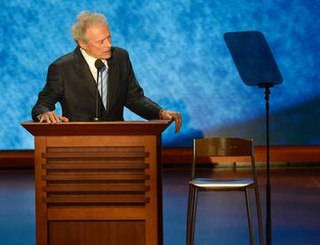 W
WOn Thursday, August 30, 2012, American actor and director Clint Eastwood gave a speech at the Republican National Convention. Eastwood had endorsed Mitt Romney for the 2012 United States presidential election earlier that month, and spent much of his speech's running time on a largely improvised routine in which he addressed an empty chair that represented President Barack Obama. The speech, broadcast in a prime time slot, was viewed live by around 30 million people. It generated many responses and much discussion.
 W
W"Free Churro" is the sixth episode of the fifth season of the American animated television series BoJack Horseman, and the 55th overall episode of the series. It was written by series creator Raphael Bob-Waksberg and directed by Amy Winfrey. The episode was made available for streaming, along with the rest of season five, via Netflix on September 14, 2018.
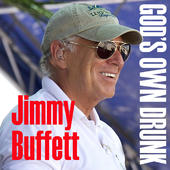 W
W"God's Own Drunk" is a monologue by Lord Buckley that musicians have since adapted into different types of songs; most notably, Jimmy Buffett, who first recorded his rendition for Living and Dying in ¾ Time and has since released a single of a live performance in 2011. Buffett's version was a concert staple and even regarded as his theme before "Margaritaville"'s popularity, until he was forced to stop playing it after being sued by Buckley's son, Dick Buckley Jr., for copyright infringement.
 W
WGood Masters! Sweet Ladies! Voices from a Medieval Village is a 2007 children's book written by Laura Amy Schlitz. The book was awarded the 2008 Newbery Medal for excellence in children's literature.
 W
WGreta Thunberg is a Swedish climate activist. She has been noted for her skills as an orator. Her speech at the 2018 United Nations climate summit made her a household name. Prior to her speaking engagements Thunberg demonstrated outside Swedish Riksdag using the signage "skolstrejk för klimatet", school strike for climate.
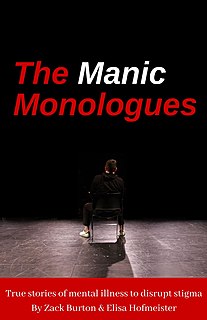 W
WThe Manic Monologues is a play developed and premiered by Zachary Burton and Elisa Hofmeister at Stanford University. The play consists of autobiographical accounts of mental illness from people diagnosed with mental health disorders, the family and friends of mental health patients, and health professionals. The play explores diagnoses including bipolar, schizophrenia, depression, OCD, and PTSD in stories that are by turns tragic, humorous, and uplifting.
 W
WMolly Bloom is a fictional character in the 1922 novel Ulysses by James Joyce. The wife of main character Leopold Bloom, she roughly corresponds to Penelope in the Odyssey. The major difference between Molly and Penelope is that while Penelope is eternally faithful, Molly is not. Molly is having an affair with Hugh 'Blazes' Boylan. Molly, whose given name is Marion, was born in Gibraltar on 8 September 1870, the daughter of Major Tweedy, an Irish military officer, and Lunita Laredo, a Gibraltarian of Spanish descent. Molly and Leopold were married on 8 October 1888. She is the mother of Milly Bloom, who, at the age of 15, has left home to study photography. She is also the mother of Rudy Bloom, who died at the age of 11 days. In Dublin, Molly is an opera singer of some renown.
 W
WA monologist, or interchangeably monologuist, is a solo artist who recites or gives dramatic readings from a monologue, soliloquy, poetry, or work of literature, for the entertainment of an audience. The term can also refer to a person who monopolizes a conversation; and, in an obsolete sense, could describe a bird with an unchanging, repetitive song.
 W
W"Pretty Baby...." is an episode of the British television soap opera EastEnders, broadcast on BBC One on 31 January 2008. It is the only EastEnders episode to feature just one character and the first of its kind in soap. It was written by Tony Jordan, directed by Clive Arnold and produced by Diederick Santer. The episode features Dot Branning, played by June Brown, recording a message for her husband Jim Branning, who is in hospital recovering from a stroke, reflecting Bardon's real-life stroke, which saw him written out of the show and allowed the opportunity for the single-hander to arise. Jordan's scripting was inspired by Samuel Beckett's Krapp's Last Tape.
 W
WThe seven dirty words are seven English-language curse words that American comedian George Carlin first listed in his 1972 "Seven Words You Can Never Say on Television" monologue. The words, in the order Carlin listed them, are "shit", "piss", "fuck", "cunt", "cocksucker", "motherfucker", and "tits".
 W
W"Tears in rain" is a 42-word monologue delivered by character Roy Batty in the 1982 Ridley Scott-directed film Blade Runner. Written by David Peoples and altered by Hauer from the scripted lines the night before filming, the monologue is frequently quoted; critic Mark Rowlands described it as "perhaps the most moving death soliloquy in cinematic history". The speech appears as the last track on the film's soundtrack album.
 W
W"To be, or not to be" is the opening phrase of a soliloquy given by Prince Hamlet in the so-called "nunnery scene" of William Shakespeare's play Hamlet, Act 3, Scene 1. In the speech, Hamlet contemplates death and suicide, bemoaning the pain and unfairness of life but acknowledging that the alternative might be worse. The opening line is one of the most widely known and quoted lines in modern English, and the soliloquy has been referenced in innumerable works of theatre, literature, and music.
 W
WThe Vagina Monologues is an episodic play written by Eve Ensler which developed and premiered at HERE Arts Center, Off-Off-Broadway in New York and was followed by an Off-Broadway run in 1996 at Westside Theatre. The play explores consensual and nonconsensual sexual experiences, body image, genital mutilation, direct and indirect encounters with reproduction, vaginal care, menstrual periods, sex work, and several other topics through the eyes of women with various ages, races, sexualities, and other differences.
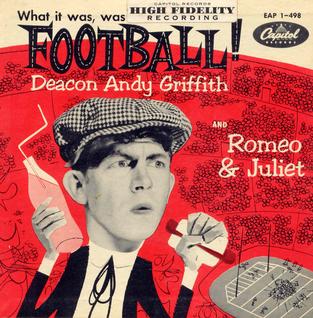 W
W“What It Was, Was Football” is a monologue by actor-comedian Andy Griffith. The monologue is a description of a college football game, as seen by a naive country preacher who attends the game by accident and is entirely puzzled by it.